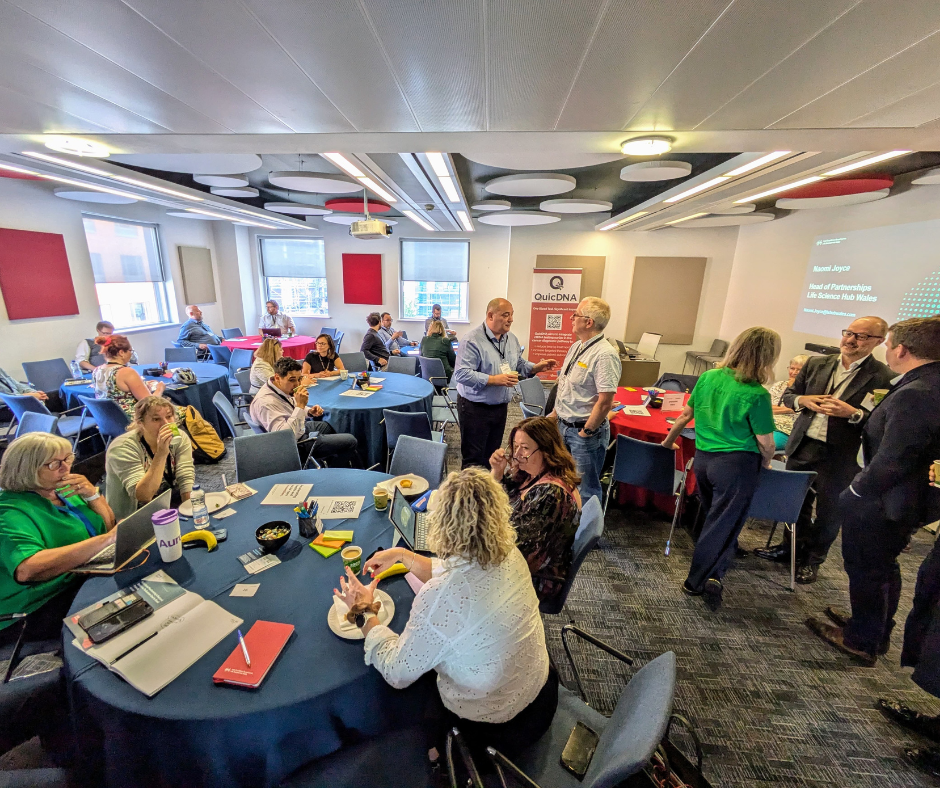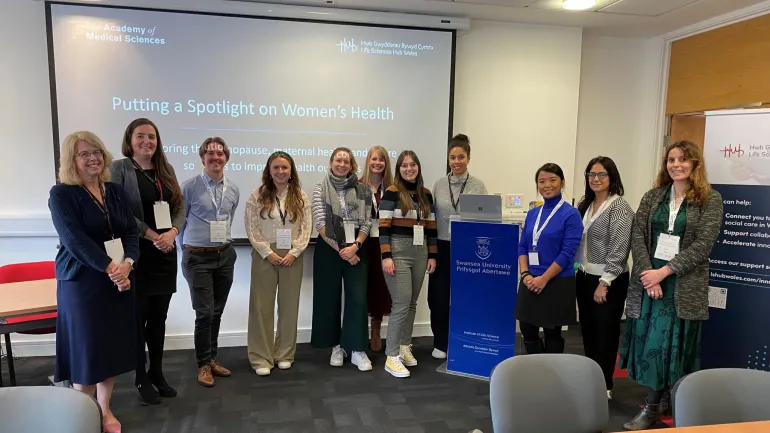In partnership with The Academy of Medical Sciences, we recently hosted an event that united innovators and researchers from diverse fields to discuss a vital topic: early detection and diagnosis of cancer. This cross-sector program is designed to foster collaboration, drive health innovation, and bridge the gap between sectors.

The event, chaired by Jason Lintern, Health Innovation Lead, Welsh Government, began with a dynamic networking session, setting the tone for a day filled with collaboration and shared learning. Jason stressed the ongoing need for Wales to lead advancements in cancer care through continuous improvement and expanded connections.
Innovative approaches to cancer diagnosis
Annie Dahl, Innovation Manager from Macmillan Cancer Support provided a snapshot of their recent collaborations, showcasing their commitment to patient-centred solutions. Key initiatives included:
- The Lucida Medical AI project. This AI-driven tool enhances prostate cancer diagnosis accuracy, streamlining workflows for clinicians and improving patient care.
- Heartsnug recyclable garment trial: An initiative aimed to enhance patient comfort during screenings by addressing the discomfort caused by traditional hospital gowns.
Dr.Magdalena Meissner, Lead Oncology Consultant at Velindre Cancer Centre, and Clinical Liquid Biopsy Lead at AWMGS shared advancements in the QuicDNA project, spotlighting the use of liquid biopsy for faster lung cancer diagnosis. The liquid biopsy reduces diagnostic pathways by several weeks, offering faster treatment decisions and improved patient outcomes across Welsh health boards.
“If we reduce the diagnostic pathway by two-three, or even sometimes four weeks, we can save lives. Tissue biopsies can be invasive and there isn’t always an opportunity to do more than one. Liquid biopsies are less invasive, and are much quicker at identifying results. The aim is to shorten the time from diagnosis to treatment and improving targeted treatment rates.” - Dr Magdalena Meissner, Lead Oncology Consultant at Velindre Cancer Centre, and Clinical Liquid Biopsy Lead at AWMGS
The impact of early detection on patient outcomes
The impact of early detection on patient outcomes cannot be overstated. Dr Elizabeth Sharkey’s session communicated the critical importance of early cancer diagnosis, providing an update on the Wales Lung Health Check pilot. This pilot has successfully identified early-stage lung cancer cases in a high-risk population.
The pilot’s success in increasing screening uptake and early diagnosis demonstrated that public awareness and targeted screening programs can lead to significant improvements in cancer outcomes in Wales.
We also heard from Julie Hepburn, Lead Lay Research Partner at the Wales Cancer Research Centre, who discussed the importance of involving patients in research for better outcomes. Julie shared her personal experience as a patient partner in research, highlighting the importance of early diagnosis to reduce the need for invasive treatments. She provided insights on increasing public awareness of bowel cancer symptoms, which is vital for improving survival rates and reducing NHS costs. Including patient perspectives like Julie’s ensures that research and healthcare initiatives remain patient-centred.
Personal impact and advocacy
Bowel cancer is the third most common cancer globally, and the second leading cause of cancer deaths in the UK. Adam Bryant, CEO & Founder of CanSense discussed their AI-powered liquid biopsy that aims to identify bowel cancer early with a single blood test. Sharing his personal journey with lymphoma, Adam highlighted the importance of early diagnosis.
“Cancer affects everyone. I’m here with great passion with what CanSense is trying to achieve. If I was diagnosed early enough, I could have had targeted treatment which could have saved me a lot of pain. Blood serum samples (liquid biopsies) can define whether someone’s got cancer. This is a really cost effective test.” – Adam Bryant, CEO & Founder of CanSense.
This quick, cost-effective diagnostic testing reduces pressure on the NHS and provides better patient experience and outcomes. By diagnosing people earlier, when bowel cancer is more treatable, clinicians and GPs can make quicker decision. Adam’s call for collaboration and support highlighted the importance of collective efforts in driving forward innovative initiatives.
Reflections from the day…
The cross-sector event on cancer early detection and diagnosis brought together diverse perspectives and expertise. Through dynamic networking and insightful presentations, we explored innovative approaches such as AI-driven tools, liquid biopsies, and patient-centred initiatives, all aimed at improving cancer care in Wales.
“A key indicator of a timely cross-sector event, very much in evidence at the LSHW/ AMS Cancer Workshop, is when experts from notionally separate backgrounds (for example commercial leaders as well as patient and clinical champions) come together and present highly consistent problem statements, in this case demonstrating a deep understanding of the challenges and opportunities across Wales’ cancer diagnosis and treatment pathways.
The event offered a unique combination of a well-defined challenge, robust evidence and a framework for collaborative engagement and delivery, all supported by the National Academy and devolved government.” – Peter Bannister, Non-Executive Director, Life Sciences Hub Wales.
The vibrant discussions and new connections made during the event leave us inspired and motivated to continue our journey towards improving cancer care through innovation and collaboration.
Are you interested in attending our next event? Join us on the 3rd of October in Swansea to discuss all things digital and data in cancer care. Register your place to attend.




